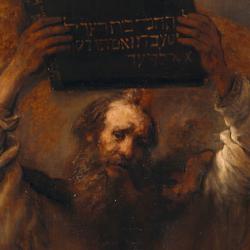The first five commandments appear to be chiastically arranged. To wit:
A. I am Yahweh; thou shalt have no other gods.
B. Thou shalt not make image, bow to it, or serve it.
C. Thou shalt not bear the name of Yahweh lightly.
B’. Remember the Sabbath.
A’. Honor your father and mother.
The suggestion that the first five words are chiastically arranged rests on verbal repetitions and conceptual parallels:
A/A’: Each of the first five commandments uses the phrase yahweh ‘eloheyka; but the first use is in the first commandment, the last use (in the ten words) is in the fifth commandment. The first commandment introduces Yahweh as the one who brought Israel from the ‘eretz of Egypt. The fifth promises long life in the ‘adamah that Yahweh gives. Together, the first and fifth commandments trace a narrative ark, from Egypt to the promised land. And these parallels suggest that the fifth word that requires honor for parents is a reflex in human society of Israel’s honor (kabed) of Father Yahweh.
B/B: The second and fourth words have similar structures. The second word starts with a prohibition against making (‘asah) images, and continues with a prohibition of bowing and serving (‘abab) them. The fourth word begins with the positive command to remember the Sabbath, and then continues with a command to labor (‘abad) and a prohibition of doing (‘asah) work on the Sabbath. Both commandments use the phrase “do not do” (lo-ta’aseh).
Both the second and fourth commandments allude to the three-story structure of the creation. Israel is prohibited from making images of anything in heaven, earth, or the waters under the earth. The fourth reminds us that Yahweh created the heavens, earth, sea, and all that is in them in six days.
More conceptually, both the second and fourth commandments govern the forms of worship – the use of images and the timing of worship respectively.
C: If this is right, the third commandment is the hinge of the first handful of commandments. This commandment itself has a simple chiastic structure:
a. Thou shalt not bear the name of Yahweh lightly
b. for Yahweh will not hold guiltless
a’. the one who bears His name lightly.
One might say that all the other commandments can be illumined by the third. There is surely something to that: Israel is marked with Yahweh’s name, and therefore should have no other gods, should not bow to images, should keep Sabbath, should honor parents. Yet that might be said of any of the commandments.
One might explore the reasons for this focus on the third word by exploring the unique themes of the commandment, which are: bearing the name, “light” v. glory, and “not pardon.” Or perhaps the first five words have a narrative structure: Yahweh delivered Israel from Egypt (#1) to bring them into rest (#4) in the land (#5). But that plan was interrupted by the golden calf (#2). The fulfillment of the exodus-to-inheritance movement depends on Israel bearing Yahweh’s name well.
Tasks for another day.















